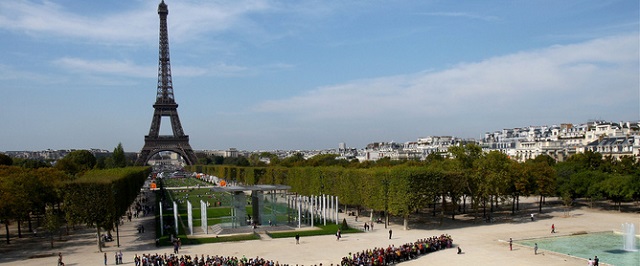Denton outlines the climate agreement Africa should seek in Paris

Credit: 350.org, via Flickr
Victoria Falls, Zimbabwe 30 October 2015 (ClimDev-Africa) – The Director of the Special Initiatives Division at the UN Economic Commission for Africa and Coordinator of the African Climate Policy Centre (ACPC) Ms. Fatima Denton has called on African negotiators to sharpen its tools and refine their strategies before they get to Paris for the next round of climate negotiations which open in Paris, France in November.
“As we sharpen our tools, refine our strategies, set our priorities, and put our best foot forward united in a common goal of inclusive development, we must take to Paris a new resolve of using our numbers, our collective voice, our agency and our strength in demanding a fair, just and binding treaty abetted by a means of implementation that will align our commitments to our development priorities”, she told delegates attending the 5th annual Conference on Climate Change and Development (CCDA 5) in Victoria Falls, Zimbabwe.
She warned that “…in Paris, we have to revisit the sacred principle of “common but differentiated responsibility” and use them to remind ourselves that “the job is not done until we, ourselves, take our rightful place in the effort to curb emission, irrespective of our levels of culpability.”
She said that after years of research and dialogue through institutions such as the ClimDev-Africa initiative, Africans are confident enough to “ask for what we want in Paris, and we are setting the dials at COP 21, but with a strong resolve to look beyond the COP.”
“Our resolve is to create a strong current that will help us sail through COP 21 in Paris and set us on a course that will ensure that our children will use the next fifty years of their lives creating prosperity, generating and securing enduring jobs, using the dividends of a transformed agricultural sector to build strong industries” she told the 400 delegates gathered here.
Sounding very assertive based on the quality of work accomplished, Ms. Denton assured that “we do not want to be remembered for “hugging” on to victimhood for too long, we want to be counted by the world and our children as doers and champions showing good examples of how we have won the fight against climate change, and entered into a new pathway of decarbonised development.”
Instead, Africa, in the post-2015 negotiations, is about building a strong coalition of partners that will support its efforts to produce bankable proposals and strong adaptation and mitigation programmes.”
Africa in a post Paris conference is about taking its best cards to the table; it is about sound arguments that will resonate with women and men located on the wrong side of the development equation; it is about becoming champions of green growth; showing the world that it can get it right through sound technologies and capacity building that will plug the information and knowledge asymmetries.
In what sounded like one of Africa’s strongest argument yet on climate change negotiations, she said that Africa should not allow Article 2 of the Convention on food security and sustainable development to be relegated to a footnote reference.
“Inadequate mitigation ambition will allow some countries to continue making excessive global emissions beyond 2020, which will have untold consequences, especially on Africa’s peoples; increasing global warming and will raise the costs of both adaptation and mitigation in Africa due to Africa’s constrained adaptive capacity”, she stressed.
It is in Africa’s best interest to work towards a successor treaty that will not only make room for soft “institutional” issues, but one that recognizes the need for hard choices and tough decisions on technology transfer, bold emissions reductions and innovative and adequate climate finance. This is one way to close the adaptation gap.
“Africa is keen to be a strong participant and contributor to a successful outcome in Paris because it knows that what gets done, or not, in Paris, may well seal the fate of millions of vulnerable groups”, she explained.
Issued by the ClimDev-Africa News Service
- Log in to post comments


